|
|
|
Sort Order |
|
|
|
Items / Page
|
|
|
|
|
|
|
| Srl | Item |
| 1 |
ID:
131351
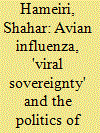

|
|
|
|
|
| Publication |
2014.
|
| Summary/Abstract |
In December 2006, Indonesian Health Minister, Siti Fadilah Supari, shocked the world when announcing her government would no longer be sharing samples of the H5N1 avian flu virus, collected from Indonesian patients, with the World Health Organization, at a time when global fears of a deadly influenza pandemic were running high. For observers of Southeast Asian politics, the decision reinforced the view of the region as made up of states determined to protect their national sovereignty, at almost all costs. This established view of the region, however, generally neglects the variable and selective manner in which sovereignty has been invoked by Southeast Asian governments, or parts thereof, and fails to identify the conditions shaping the deployment of sovereignty. In this paper, it is argued that Siti's action was designed to harness claims of sovereignty to a domestic political struggle. It was a response to the growing fragmentation and, in some cases, denationalisation of the governance apparatus dealing with public health in Indonesia, along with the 'securitisation' of H5N1 internationally. The examination of the virus-sharing dispute demonstrates that in Southeast Asia sovereignty is not so much the ends of government action, but the means utilised by government actors for advancing particular political goals.
|
|
|
|
|
|
|
|
|
|
|
|
|
|
|
|
| 2 |
ID:
184645


|
|
|
|
|
| Summary/Abstract |
The internationalization of medical services—including organ transplantations—is driven by advances in technology and integration of trade. Patients in need of organ transplants began to seek these services outside their countries of origin in the 1980s and 1990s, and this practice expanded in the ensuing decades. While these transplants yielded benefits to some, abuses included human trafficking, preying on vulnerable populations, and negative outcomes in health equity. This case study of efforts to regulate the international transplant trade yields important findings for our understanding of global health governance. First, it provides support to the “globalization reformers” who maintain that if globalization’s benefits are to be widely distributed, institutional mechanisms must be enacted. Second, it provides another example of the externalities that occur when health concerns are absent, poorly represented, or weakened in trade negotiations. Finally, it demonstrates limits of a global health regime that lacks a centralized authority.
|
|
|
|
|
|
|
|
|
|
|
|
|
|
|
|
| 3 |
ID:
130707
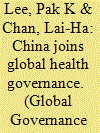

|
|
|
|
|
| Publication |
2014.
|
| Summary/Abstract |
In the wake of China's rapid ascendancy, are there any new rules made by the country in global health governance? This article examines China's emerging role in the Agreement on Trade Related Aspects of Intellectual Property Rights and finds that China adopts a pro-status quo stance on patented medicines. Aspiring to develop its own pharmaceutical sector to be capable to produce patented medicines on a par with the West, it has little appetite for using the prevailing rules or making new rules that are to the liking of the developing world. Undoubtedly, China is a new player in global health governance but has yet to have agenda-setting intent and capacity. This article argues that China's behavior and preferences can be explained by its dualistic national identities, the dominant position of realism in both the study of international relations and policy circles, and an underdevelopment of epistemic community in global health governance in the country.
|
|
|
|
|
|
|
|
|
|
|
|
|
|
|
|
| 4 |
ID:
144250
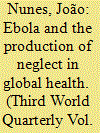

|
|
|
|
|
| Summary/Abstract |
This article argues that the 2014 Ebola outbreak in West Africa reinscribed the neglect that has surrounded this disease. The argument develops theoretical tools for understanding how neglect is produced in global health. Arguing that neglect is connected with the production of harm and vulnerability, it stresses the importance of emotions in issue-prioritisation in global health. Focusing on the dynamics of abjection, the article shows how the 2014 Ebola outbreak was framed as a (racialised) African problem and obfuscated by a political and media spectacle. The result was the preference for short-term crisis-management responses that detracted from long-term structural solutions.
|
|
|
|
|
|
|
|
|
|
|
|
|
|
|
|
| 5 |
ID:
144249
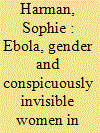

|
|
|
|
|
| Summary/Abstract |
The international response to Ebola brings into stark contention the conspicuous invisibility of women and gender in global health governance. Developing feminist research on gender blindness, care and male bias, this article uses Ebola as a case to explore how global health rests on the conspicuous free labour of women in formal and informal care roles, yet renders women invisible in policy and practice. The article does so by demonstrating the conspicuous invisibility of women and gender in narratives on Ebola, emergency and long-term strategies to contain the disease, and in the health system strengthening plans of the World Health Organization and World Bank.
|
|
|
|
|
|
|
|
|
|
|
|
|
|
|
|
| 6 |
ID:
171085
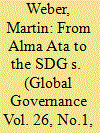

|
|
|
|
|
| Summary/Abstract |
The Alma Ata Declaration of 1978 proclaimed “health for all by the year 2000.” In 2019 health is mainstreamed through the United Nations’ 2030 Sustainable Development Goals (SDG s) initiative. Contributing to critical analysis of global health governance (GHG), this article reconstructs the normative premises of the Alma Ata Declaration, the political project it represented, and the successful cases it was inspired by. It contrasts this with an account of the emergence and gradual consolidation of the GHG agenda that is today reflected in the SDG s. The calls for a return to the Alma Ata Declaration resonate strongly among human rights advocates, community activists, and the medical profession. This is because of the socially exclusionary effects of the dominant health governance agenda shaped by distinctively neoliberal premises. The article argues that in the final analysis the two different approaches reflect very different ideas and ideals about “who global health governance is for.”
|
|
|
|
|
|
|
|
|
|
|
|
|
|
|
|
| 7 |
ID:
137169


|
|
|
|
|
| Summary/Abstract |
The emergency–development continuum, also known as “linking relief, rehabilitation, and development” (LRRD), has been a conceptual, institutional, and programmatic preoccupation for aid organizations and humanitarian policymakers for well over two decades. The objective of this short paper is to introduce the idea of the emergency–development continuum and, only partly ironically, to advance the notion that we should not bother with it: operationally, it has done more harm than good, driving the work of humanitarian organizations in directions that run counter to the interests of the people they are trying to serve.
|
|
|
|
|
|
|
|
|
|
|
|
|
|
|
|
| 8 |
ID:
156236


|
|
|
|
|
| Summary/Abstract |
Over the course of a single generation, the international community has undergone a radical shift in its views on its collective obligation to address health in low- and middle-income countries. This shift toward accepting the need to respond to global health concerns is rhetorical, behavioral, and financial—and has been maintained even in light of the incredible economic issues and austerity policies that have faced high-income states since 2008. What explains this shift in the international community's sense of obligation and the necessity of actuating an effective response? This article argues that the role and prominence of global health governance within international society reflects its emergence as a secondary institution within international society.
|
|
|
|
|
|
|
|
|
|
|
|
|
|
|
|
| 9 |
ID:
163177


|
|
|
|
|
| Summary/Abstract |
The role of regional organisations in dealing with global health challenges cannot be understated. Against current and emerging health threats, strong and effective regional collaboration in health security provides a critical pillar in advancing global health governance, allowing for significant interventions in building health systems capacity at national and regional level, improving disease surveillance and response, and strengthening international efforts in responding to a wide spectrum of global health challenges. While regional health cooperation in Asia has come a long way since the 2003 Severe Acute Respiratory Syndrome crisis and the establishments of regional frameworks in East Asia in fighting pandemics and infectious diseases, more can certainly be done to improve collective efforts to deal with emerging health issues such as climate-related diseases and antimicrobial resistance, as well as rising incidence of non-communicable diseases. The expanding regional and global health agenda should compel ASEAN to work closer toward a more comprehensive human security approach to health—one that does not prioritise pandemics over other health threats, while continuing to strengthen public health systems.
|
|
|
|
|
|
|
|
|
|
|
|
|
|
|
|
| 10 |
ID:
185098
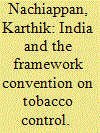

|
|
|
|
|
| Summary/Abstract |
This paper investigates why India actively negotiated and ratified the Framework Convention on Tobacco Control (FCTC), the first global health treaty to curb tobacco use worldwide. The World Health Organization’s (WHO) decision to conduct FCTC negotiations aligned with India’s shifting disease burden that was pivoting from infectious to non-communicable diseases, particularly cancer, which shot up due to surging tobacco use. The WHO’s decision to frame the agreement around constraining global tobacco commerce, particularly the might of multinational tobacco companies, meshed with the interests of New Delhi, which was concurrently seeking to curb surging tobacco consumption. This triggered a positive approach and attitude to FCTC negotiations, leading to India’s ratification. India’s negotiation and ratification of the FCTC shows that the literature(s) on rising powers and international organizations must consider how factors like the WHO’s institutional politics, specifically the intent to negotiate a focused global agreement to curb tobacco production and distribution worldwide, affects how countries perceive and seek to use that agreement to bolster domestic policy concerns like tobacco control.
|
|
|
|
|
|
|
|
|
|
|
|
|
|
|
|
| 11 |
ID:
177078


|
|
|
|
|
| Summary/Abstract |
Many developing countries made enormous efforts in the battle against the Novel Coronavirus (COVID-19) during the early phase of the pandemic, but, as the threat of infection persists over the long term, these countries have had to face an increasingly serious situation. An examination of the United States, Europe, China, and other countries and regions shows that a crisis in global health governance has occurred. Japan has, so far, been successful in limiting the number of deaths. The organizations and human resources in developing countries that Japan has long supported are active as central hubs that are attempting to combat COVID-19. This demonstrates the effectiveness of Japan’s development cooperation, based on the principles of Human Security, which are designed to support self-reliance of developing countries. However, this support remains small scale and lacks a comprehensive strategy. Japan should demonstrate its leadership by markedly increasing its international cooperation efforts in the health sector. Japan values both freedom and democracy, cooperates with a variety of actors around the world who wish to see these Human Security principles universally implemented, and is thus able to contribute to the construction of a “new world” that protects people’s lives, livelihoods, and dignity from a wide range of threats.
|
|
|
|
|
|
|
|
|
|
|
|
|
|
|
|
| 12 |
ID:
141061


|
|
|
|
|
| Summary/Abstract |
Academics and policymakers often argue that global health policy greatly affects and influences national health systems because these policies transfer and implant ‘best practice’ norms and accountability techniques into local health systems. On the whole these arguments about the ‘diffusion of norms’ have merit since there is considerable evidence to suggest the existence of a positive correlation between global norms and national behaviour. Nevertheless, this article argues that traditional analytical frameworks to explain norm diffusion underplay the fact that norms are significantly ‘glocalised’ by national actors and further discount the role that national leadership plays in strengthening health systems. In response, this article presents a ten-year comparative paired study of the participatory governance mechanisms of the South African health system and its health strengthening measures. In doing so, the role of the national government in their relations with the Global Fund to Fight AIDS, Tuberculosis, and Malaria (GFATM) will be examined and how key ‘partnership’ norms were amalgamated into health governance mechanisms. It will be argued that although global policy plays an important guiding role, health norms are never transcribed straightforwardly and a central element to successful health governance remains vested in the nation and the leadership role it exerts.
|
|
|
|
|
|
|
|
|
|
|
|
|
|
|
|
| 13 |
ID:
153145
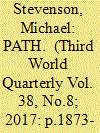

|
|
|
|
|
| Summary/Abstract |
Seattle-based PATH is one of the world’s largest not-for profit organisations focused on improving health in low-income countries. This article argues the history of this understudied organisation is critical to understanding how collective action focused on facilitating developing countries’ access to essential health technologies is structured. Since its establishment almost 40 years ago, the organisation has been a catalyst for multidisciplinary public–private collaboration that has produced affordable, culturally appropriate health technologies. From its origins in reproductive health, enabling contraceptive technology transfers and advising on regulatory standards, to its more recent managerial roles in the development of inexpensive vaccines produced in developing countries, PATH has repeatedly illustrated how public–private collaboration in product research and development can increase poor populations’ access to essential health technologies. This in turn has provided substance to the contested narrative that engaging business is critical to reducing global health disparities.
|
|
|
|
|
|
|
|
|
|
|
|
|
|
|
|
| 14 |
ID:
175395
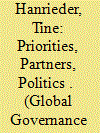

|
|
|
|
|
| Summary/Abstract |
The World Health Organization (WHO) is once more asked to reinvent itself and become more effective. This essay discusses recurrent reform proposals directed at the WHO which, in different ways, ask it to find a strategic focus and thereby its niche in the crowded global health arena. Looking back at decades of reform endeavors at the WHO, it exposes the contradictions and unresolved normative conflicts with regard to the WHO’s priorities. Ultimately, the WHO’s effectiveness hinges on Member State support for public authority in global health, and thus the political commitment to protect it against capture by special interests.
|
|
|
|
|
|
|
|
|
|
|
|
|
|
|
|
| 15 |
ID:
159205


|
|
|
|
|
| Summary/Abstract |
This article uses the ongoing policy debate over “harm reduction” as a lens for examining the complex relationships between global health governance and the global governance of other issue areas—in this case, the global narcotics control regime. Examining the dynamics of policy entrepreneurship at this interface, I argue that both material and ideational power matter, and that there is a need to better understand the potential influence that global health institutions have in other policy spheres and the extent to which framing can be a successful advocacy strategy. Without denying the potential for policy entrepreneurship, I argue that this case offers some insights into how power and influence operate at such interfaces, which can be important in better understanding the potential for global health institutions to successfully promote pro-health policies.
|
|
|
|
|
|
|
|
|
|
|
|
|
|
|
|
| 16 |
ID:
144247


|
|
|
|
|
| Summary/Abstract |
The international Ebola response mirrors two broader trends in global health governance: (1) the framing of infectious disease outbreaks as a security threat; and (2) a tendency to respond by providing medicines and vaccines. This article identifies three mechanisms that interlink these trends. First, securitisation encourages technological policy responses. Second, it creates an exceptional political space in which pharmaceutical development can be freed from constraints. Third, it creates an institutional architecture that facilitates pharmaceutical policy responses. The ways in which the securitisation of health reinforces pharmaceutical policy strategies must, the article concludes, be included in ongoing efforts to evaluate them normatively and politically.
|
|
|
|
|
|
|
|
|
|
|
|
|
|
|
|
| 17 |
ID:
139584


|
|
|
|
|
| Summary/Abstract |
Tackling germs, negotiating norms, and securing access to medicines are persistent challenges that disproportionally affect developing countries' participation in global health governance. Furthermore, over the last two decades, the excessive focus on global pandemics and security in global health diplomacy, rendered peripheral diseases that usually strike the poor and vulnerable, creating situations of marginalisation and inequality across societies. However, as the importance of regions and regionalism increases in global politics, and integration ambitions and initiatives extend beyond trade and investment to embrace welfare policy, there are new opportunities to explore whether and how regional commitments affect health equity and access to medicine in developing nations. What, if any, are the possibilities for meso-level institutions to provide leadership and direction in support of alternative practices of global (health) governance? Can regional polities become international advocacy actors in support of global justice goals? This article addresses these questions by analysing regional health diplomacy in South America. The article argues that regional organisations can become sites for collective action and pivotal actors in the advocacy of rights (to health) enabling diplomatic and strategic options to member state and nonstate actors, and playing a role as deal-broker in international organisations by engaging in new forms of regional health diplomacy.
|
|
|
|
|
|
|
|
|
|
|
|
|
|
|
|
| 18 |
ID:
184097
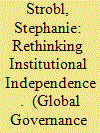

|
|
|
|
|
| Summary/Abstract |
This article examines institutional independence using the examples of the World Health Organization (WHO) and of the Public Health Emergencies of International Concern (PHEIC s) in a theoretical and a practical approach. It highlights the two different sources of authority of the WHO Secretariat, based on conditional negotiated legitimacy and epistemologically derived legitimacy, and how this authority is threatened by an increase in state party influence beyond what is envisaged in the WHO’s institutional setup. As a practical example, the article uses the PHEIC determinations, when the criteria as set out in the International Health Regulations (IHR) are not sufficient to explain the director-general’s decision to determine a PHEIC. Instead, this article offers evidence of state party influence. This challenge to the WHO’s legitimacy leads to a lack of institutional independence and, subsequently, to a declining basis for cooperation.
|
|
|
|
|
|
|
|
|
|
|
|
|
|
|
|
| 19 |
ID:
141062
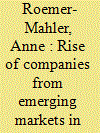

|
|
|
|
|
| Summary/Abstract |
The article analyses the involvement of pharmaceutical companies from emerging markets in global health governance. It finds that they play a central role as low-cost suppliers of medicines and vaccines and, increasingly, new technologies. In so doing, pharmaceutical companies from emerging markets have facilitated the implementation of a key goal of global health policy: widening access to pharmaceutical treatment and prevention. Yet, looking closer at the political economy underlying their involvement, the article exposes a tension between this policy goal and the political economy of pharmaceutical development and production. By declaring access to pharmaceuticals a goal of global health policy, governments and global health partnerships have made themselves dependent on pharmaceutical companies to supply them. Moreover, to provide pharmaceutical treatment and prevention at the global level, they depend on companies to supply medicines and vaccines at extremely low prices. Yet, the development and production of pharmaceuticals is organised around commercial incentives that are at odds with the prices required. The increasing involvement of low-cost suppliers from emerging markets mitigates this tension in the short run. In the long run, this tension endangers the sustainability of global access policies and may even undermine some of the successes already achieved.
|
|
|
|
|
|
|
|
|
|
|
|
|
|
|
|
| 20 |
ID:
187522


|
|
|
|
|
| Summary/Abstract |
Since 2000, health issues have increasingly been discussed at the UN Security Council (UNSC) without consensus being built on how and when the Council address health topics, or on its role in global health governance. As the contributions in this issue show, high-profile infectious disease outbreaks as well as the disruption of healthcare delivery and assistance in conflict settings have driven the health agenda at UNSC debates, but that agenda has remained ad hoc. Health topics seem most likely to be put on the agenda when the P5 perceive a particular health issue as a threat to international peace and security, or when the social and economic consequences of a health crisis potentially destabilise countries or regions. That raises another political question, however: under what circumstances are they likely to perceive health issues in those terms, and whose interests are being prioritised in such a determination?
|
|
|
|
|
|
|
|
|
|
|
|
|
|
|
|
|
|
|
|
|